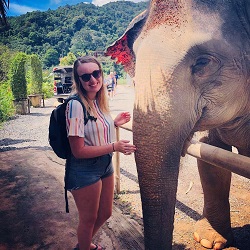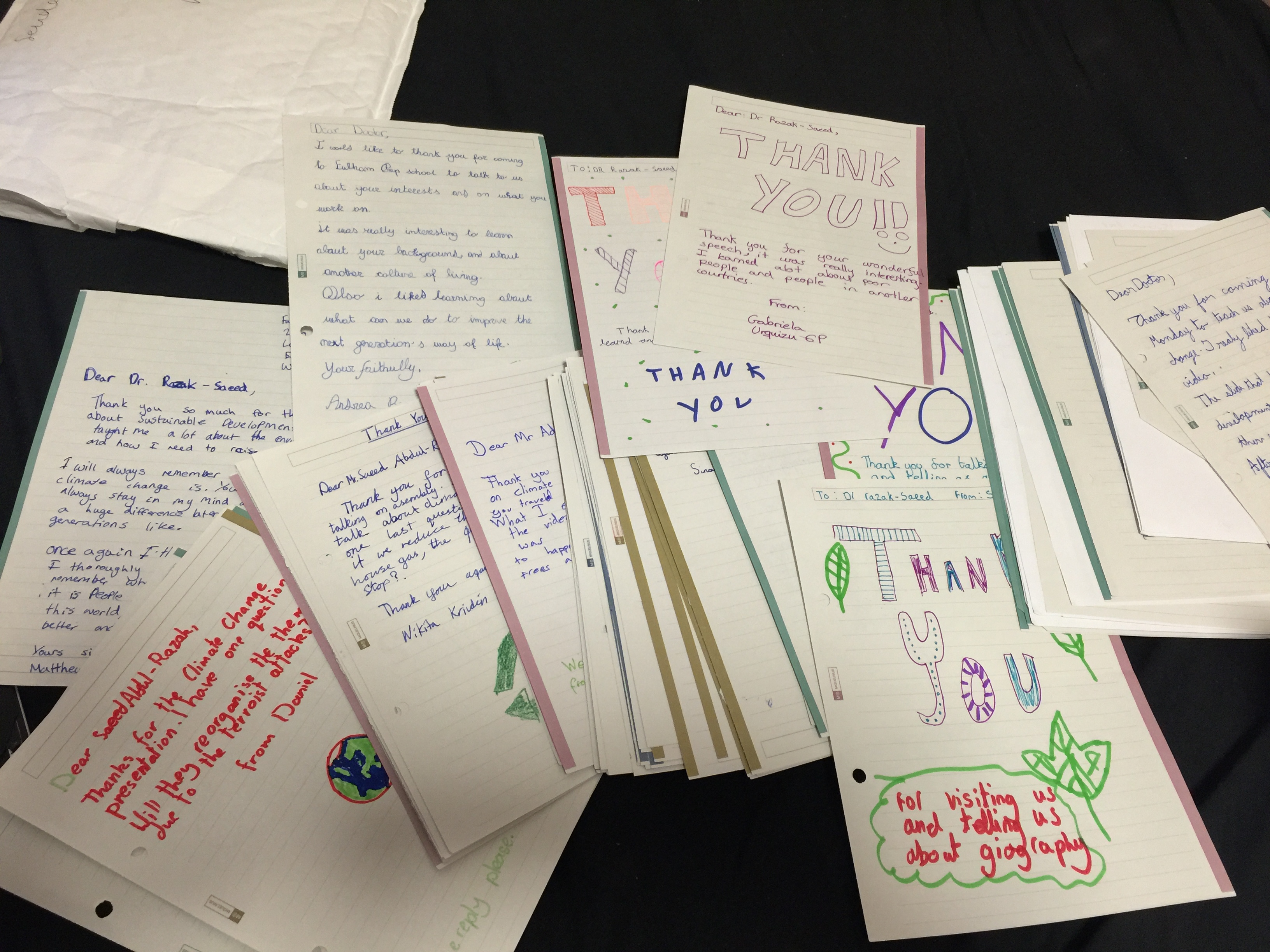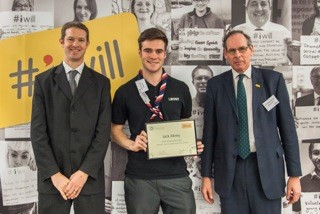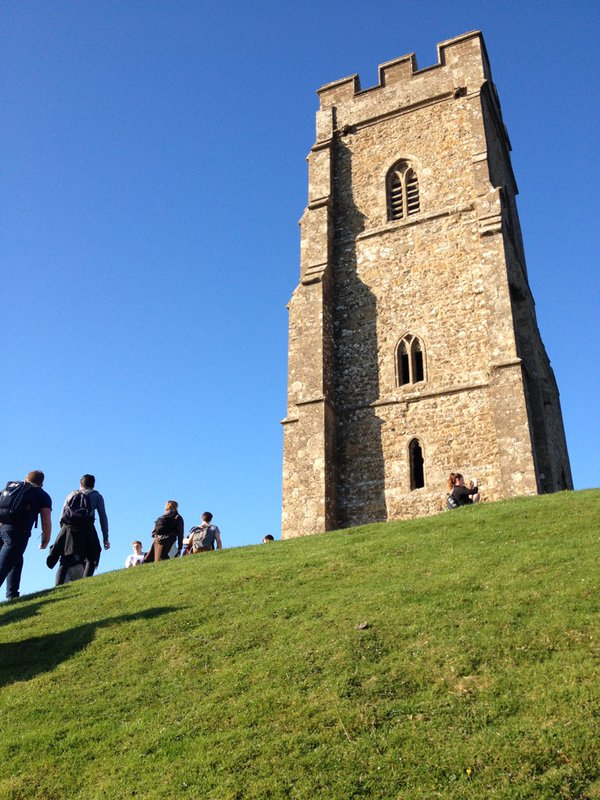We’re always a fan of women supporting women, and this year we’re marking International Women’s Day by introducing two brilliant BSc Human Geography graduates. Heather Cadden graduated in 2015 and mentored Amelia Harper, who graduated in 2018; both are now working in in Corporate Social Responsibility/Ethics.
Find out more about where they are now, what they do, why it matters – and how they’re paying it forward to current students.
 Heather Cadden works in ethical business/CSR at Marks & Spencer.
Heather Cadden works in ethical business/CSR at Marks & Spencer.
“I always loved social sciences and understanding different cultures and I felt like human geography at Reading was the right mix of the social aspects I loved of sociology at A-level and the international aspect of Geography. When I came to visit on an open day I fell in love with the campus and the course, especially the Erasmus program which I completed at the University of Groningen in my final year.”
Career inspiration
“I remember being so inspired when I was young when we did a project on Fairtrade. We all had to bring a Fairtrade product in – this was about 2000/2001 so it was mainly bananas, chocolate and coffee – and we then spent the show and tell being told all about the experiences of people in global supply chains and that initially caught my attention.
Fast forward to my time at Reading and I did two modules on development in second and third year, which studied life in the global south, considered child labour and the ILO conventions. We did a project presenting as H&M and our stance on child labour in the supply chain, which was such an eye opener to the world of CSR and what a career path might look like.
After a brief stint in Geography teaching I set my heart on a role in CSR. I was fortunate to get an Ethical Assistant role at George @ Asda’s Head Office, working with clothing supply chains, and about 18 months after that I moved to M&S Food to work in their Ethical Trade and human rights team.”
Working for a better future
“All my roles have had the rights of workers in supply chains as our focus, which means that every area we work on impacts women in many different ways. In my current role we work closely with our suppliers to monitor their ethical standards but also encourage them to share best practice together and support each other if they have any issues. From the events we run to the day to day reports we grade, all the elements of work are to ensure we’re improving the experiences of workers in supply chains and by doing that we impact the women who work in those chains. We also work closely with other retailers to ensure we are working to similar goals and supporting workers.
One thing we did last Christmas was as a team, instead of doing a team secret Santa, I helped organise a box of hats, gloves and scarves for the Snowdrop Project – a charity that works to support and empower victims of modern slavery in the UK. This was a very small impact but I hope we keep working closely with charities and initiatives like this!”
Paying it forward: student mentoring
“Since graduating I’ve stayed in close contact with my lecturer Dr Sally Lloyd-Evans, and she’s been my referee. As I kept in contact when changing jobs we got to speaking about me coming into a lecture and chatting about my job. The first year I felt really underqualified so I offered to mentor a student instead. So from October 2017 I’ve been mentoring Amelia who was a final year student and now works in the CSR team at New Look. So this academic year we thought it would be great for us both to come back to Reading, talk about our jobs, the different ways companies approach CSR & Ethical and also how our mentoring relationship worked.
I’m currently speaking to quite a few students from Reading, and have offered my help and experience to any of them if they need it. I recently held a brand, retailer and supplier event on Responsible Recruitment at M&S’s offices and offered volunteer places to the students I’m in contact with so they could get some day-to-day ethical experience, but also be in a room full of brands, retailers and suppliers that are from a varied industry background so they’re not just hearing from me. I hope to offer this out to students for all events I manage as it’s a big part of my role.”
Ambitions for the future
“I hope to never leave this field! I’m really keen to travel and visit more factories and growers in global supply chains, I’d like to work between fashion and food as the similarities and differences are so interesting to me. I really want personally to look into ways technology can support us to help workers better and get more opportunities to heard their experiences.”
 Amelia Harper works in Corporate Social Responsibility/Ethics at New Look.
Amelia Harper works in Corporate Social Responsibility/Ethics at New Look.
“I enjoyed geography at school as I found it interesting learning about the world – especially places I hadn’t visited. I chose to focus on Human Geography because I wanted to learn more about human relationships with the world, different cultures, international development and University of Reading was one of the universities that offered just a Human Geography degree. On the Open Day, I got the impression that there was so much opportunity for me at Reading and the modules that they offered were so diverse. I also had never been to Reading before so was excited to experience somewhere new.”
Career Inspiration
“Throughout my studies I didn’t know exactly what I wanted to do after graduation, but I always knew I wanted it to be centred around sustainability or helping people. My interest in sustainability developed at quite a young age – I remember that in year 7 I was on the green council and would spend my break times talking to the headmistress about recycling bins!
During my time at university, I chose modules which looked at environmental issues, development, labour markets, economic geography, and cultural geography. Sally Lloyd-Evans’s third-year module Global Justice, Labour and Development first introduced me to the idea of corporate social responsibility/ethical trade. In the module we looked at the responsibility that corporations have for their complex supply chains, welfare of all workers (head office to factory workers) and their impact on the environment. I was shocked to learn about the environmental and ethical issues within supply chains and as I was now aware of these issues, I wanted to be a part of solving them. It was this, and Sally’s passion, that inspired me to work in CSR – I wanted to help those that are often invisible to consumers/corporations and not given an opportunity to voice inequality.”
Meeting Heather
“In one of our lectures Sally mentioned that she knew a Reading graduate that now worked at M&S in the ethical trade department, so I asked to meet her. I met with Heather and I asked her what she did day to day and how she got into ethical trade. After our coffee, Heather would check how I was getting on and send me any job roles/work experience that she felt I would be interested in; I eventually landed work experience at New Look in their CSR department soon after graduation.
During my work experience, I was shown the basics such as the Ethical Trade Initiative Base Code (the ethical trade/CSR Ten Commandments!), different country risks, registering factories and suppliers, getting to know the supply base, looking at factory audits, looking at country minimum wages and minimum working ages etc. After two weeks, I was offered a job and have been working at New Look since August 2018. It is definitely an interesting area to work in as there are new challenges emerging all the time and I think as consumers become more aware, ethical trade and sustainability jobs will become vital to all businesses.”
Working for a better future
“I’m fortunate that I have been involved with both ethical trade and sustainability aspects of CSR. Most recently my role has focused on the sustainability side of the business, which has involved looking for more sustainable alternatives for our most used materials such as cotton, polyester and viscose. I have spent time engaging with the product teams to educate them on the positive impacts of these alternatives and encouraging them to increase their uptake of more sustainable alternatives in their products.
During my lectures with Sally, I remember learning about the inequalities that female farmers are often subject to, such as financial exclusion and reduced access to land, fertilisers, seeds, training and education. So, by increasing our organic cotton uptake, we are encouraging local farmers to use less toxic pesticides/fertilisers which are damaging to their health. We have also been working with Better Cotton Initiative, a not-for profit, which invests in projects that educate local farmers with better agricultural methods such as more efficient irrigation systems that ultimately increase their cotton yields and provide farmers with a better wage to provide for their families. This impacts women as in many developing countries the majority of agricultural workers are female.”
Paying it forward: student mentoring
“In the talk Heather and I recently gave to students, I discussed all the projects that we work on at New Look and what a normal day would be like for me. I think it was interesting for students to see the differences between my job in fashion, more sustainability-based, to Heather’s role in food, more ethical trade based – it highlighted that there is not a one size fits all approach to CSR, each corporation takes a slightly different angle. I also talked about how I got into CSR and what students could do to improve their CVs for a CSR job.
After giving the talk at Reading, I connected with students on LinkedIn so that I could forward job roles/ work experience to them and make sure I was available for students to ask me any questions they may have. Heather and I are hoping to return to Reading in the future to give lectures to more students to help them understand the realities of the industry and give advice on how to get into it. Or at least, raise awareness of the industry and encourage people to make more sustainable and ethical decisions in everyday life.
I think a part of being a mentor is often just being a friendly face as leaving university can be daunting if you don’t know what you want to do or where to start. Most students just need a push in the right direction of where to look for jobs or what a sort of job to apply for then everything falls into place. I also think it’s useful to be in contact with someone that you can relate to as it is likely that you will experience similar setbacks and you are also more likely to approach them for advice. I hope in the future when I am more experienced and established, I could potentially offer students a job or work experience to get them started in the industry. I just feel so grateful for Heather and Sally helping me get to where I am today that I wanted to support other students in a similar way.”
Ambitions for the future
“I plan to continue working in ethical trade/CSR within the fashion industry for a few more years as I think so much will change in the near future and enjoy the fast-paced environment. But I think looking further into the future, I would like to work for an NGO or charity which works directly with those in the supply chain such as, farmers, factory workers or homeworkers, as I would love to be involved with the projects that can positively impact them and create fairer working conditions.”














